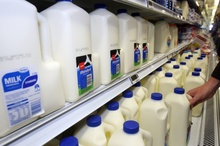Friday Apr 12, 2013

Fonterra’s not-so-little brother, Westland Milk, has no plans to substantially alter the co-operative model under which it operates
Westland, one of New Zealand’s top 100 businesses with turnover of more than $530 million, processes about 4 per cent of the country’s dairy supply.
Since the advent of Trading Among Farmers (TAF), there’s been a trickle of Fonterra farmers – mostly from Canterbury – coming over to Westland.
Industry insiders say that’s because some Fonterra farmers perceive TAF as having diminished their control over the co-operative.
Then there is the maths. The co-operative model dictates that farmers buy shares in the co-op to supply milk.
In Fonterra’s case, the Fonterra share price has mirrored the price of units in the hugely popular Fonterra Shareholders’ Fund, which debuted on the NZX last November.
With the Fonterra share price leaping from $4.52 before TAF to $7.42 today, there is a temptation for Fonterra farmers to sell their shares and opt for another processor.
For the privilege of supplying milk to Westland, farmers pay just $1.50 a share.
Westland chief executive Rod Quin says interest from Canterbury dairy farmers wanting to join Westland has increased significantly in recent months.
When Fonterra was formed in 2001, Westland and Morrinsville-based Tatua opted to go it alone.
Tatua now has 109 shareholder farmers who supply it with milk, all within 12km of the manufacturing facilities.
A total of 190 million litres of milk is processed at Tatua per year. Tatua makes dairy ingredients, the bulk of which are exported.
The rest of the processing market is made up of the dairy companies.
In the South Island, where most of the industry’s growth is coming from, there is Synlait in Canterbury.
Synlait is owned primarily by 100 or so New Zealand shareholders. Japan’s Mitsui has been a shareholder since 2006, and has a 22.5 per cent stake.
Synlait Ltd owns 49 per cent of Synlait Milk – the dairy processor – and China’s Bright Dairy has the controlling 51 per cent stake.
A separate company, Synlait Farms, sends its product to Synlait Milk.
Synlait Farms shares started trading on the Unlisted trading platform last month.
The company’s chief executive, Juliet Maclean, says the listing was to provide options to enhance liquidity to shareholders. Synlait Farms owns and manages 13 farms in mid-Canterbury.
In the North Island, Open Country Dairy was formed in 2001 to take advantage of opportunities that would arise after the passing of the Dairy Industry Restructuring Act – the legislation that allowed a near-monopoly to be created in the form of Fonterra.
Open Country’s strategy has been to site its factories in the pre-eminent dairying areas of New Zealand.
Open Country sources its milk from the areas surrounding its factories and is now supplied by more than 500 independent dairy farmers.
China’s presence has been growing in the dairy processing market.
The People’s Republic’s Yashili has Overseas Investment Office approval to build a $212 million processing plant in Pokeno, 50km south of Auckland. At this stage Yashili does not plan to source milk directly from farmers.
Yili – China’s largest dairy company – will also spend $214 million building an infant formula plant in South Canterbury in a deal that will see it take over Oceania Dairy Group.
